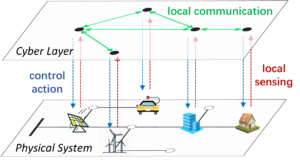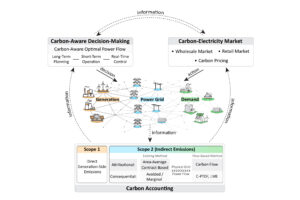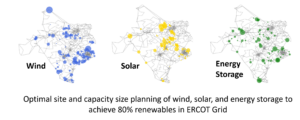Our SPEED lab is dedicated to both theoretical advances and practical applications that lead to smart autonomous sustainable power and energy systems. The four main research directions are briefly presented below.
I. Scalable AI-Based Control and Optimization
For many complex engineering systems, such as power systems, the tasks of optimization and control are becoming more and more challenging due to unknown models, uncertainties, human-in-the-loop, etc. The explosion of data and recent advances in AI techniques provide an unprecedented opportunity to overcome these challenges through scalable learning-assisted decision-making schemes. Specifically, we are interested in
- Zeroth-Order Feedback Control and Optimization [1][2]
- Reinforcement Learning
- Learning-Accelerated Optimization
- Neural ODE and Neural Koopman Operator
and their applications to complex human-cyber-physical energy systems [3].
II. Autonomous Coordination of Massive DERs

In the recent decades, the power grids have witnessed a proliferation of Distributed Energy Resources (DERs), such as energy storage, responsive demands, PV panels, electric vehicles, etc. The coordination of massive DERs can provide enormous power flexibility to facilitate reliable and resilient power systems operation. However, it is daunting to coordinate a huge amount of heterogeneous DER devices, especially when human users are involved. To this end, we study power flexibility aggregation [4] [5] to aggregate the collective flexibility of massive DERs for day-ahead or hours-ahead power dispatch, and develop online learning and distributed control for real-time DER coordination. Practical applications include load-side frequency control [6], voltage control [7], residential demand response [8] [9], EV charging coordination, etc.
III. Carbon-Electricity Nexus and Grid Decarbonization

Decarbonization is an urgent priority to mitigate climate change and ensure a sustainable future for the environment and human society. In addition to implementing decarbonization measures and regulations on
the generation side, it is crucial to leverage the extensive resources, actions, and technologies on the demand side to effectively decarbonize the power sector. We aim to establish a foundational framework [10] to frame the problems and solutions in the emerging area of carbon-electricity nexus, where the key is to align the carbon accounting, decarbonization decision-making, and carbon-electricity market with physical power grids and underlying power flow.
IV. High-Renewable-Penetration System Planning, Operation, and Control
To combat climate change and achieve carbon-neutrality, the power and energy system is undergoing an architectural transformation towards “high renewable penetration + deep electrification”. On the one hand, large-capacity synchronous generators are being replaced by a large amount of distributed power electronics inverter-interfaced units, leading to less system inertia and different system dynamics. On the other hand, large-scale renewable generations bring significant uncertainties and fast power disturbances to the grid, jeopardizing system security and reliability. We study new methodology and mechanisms to accommodate high renewable penetration through the coordination at different timescales:
- In long term: optimal system planning to achieve high renewable penetration with reliability guarantees.
- In short term: robust adaptive system operation with high economic efficiency yet at low risk.
- In real time: dynamics modeling and intelligent control of inverter-dominant systems.

